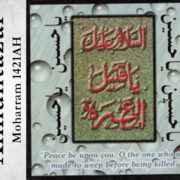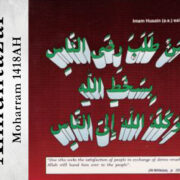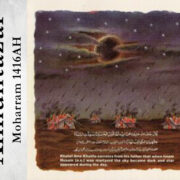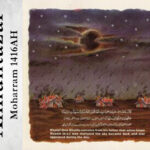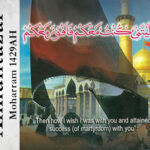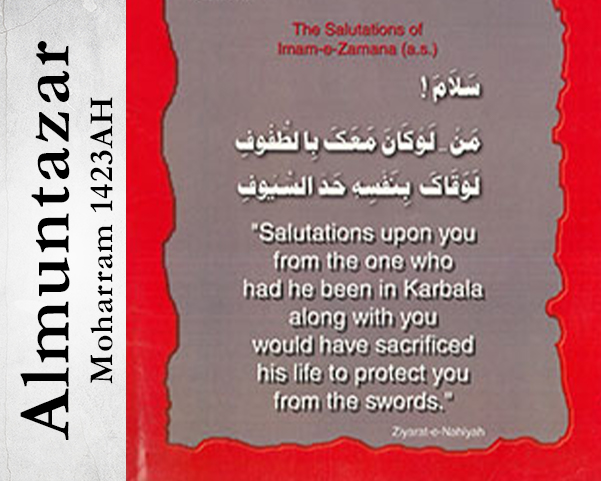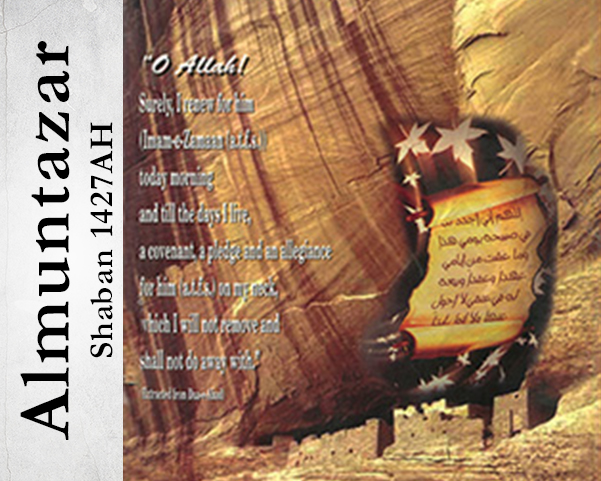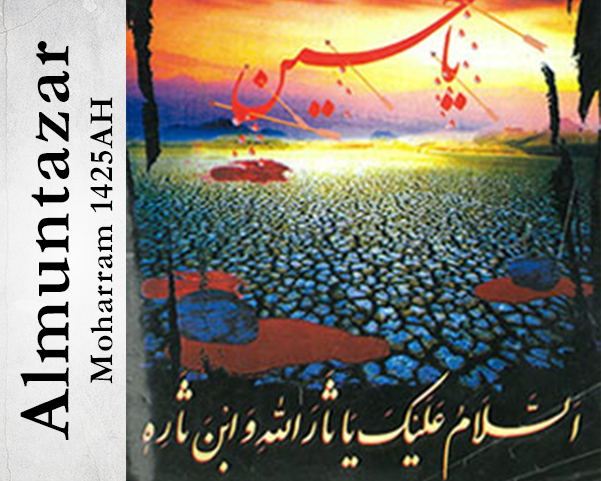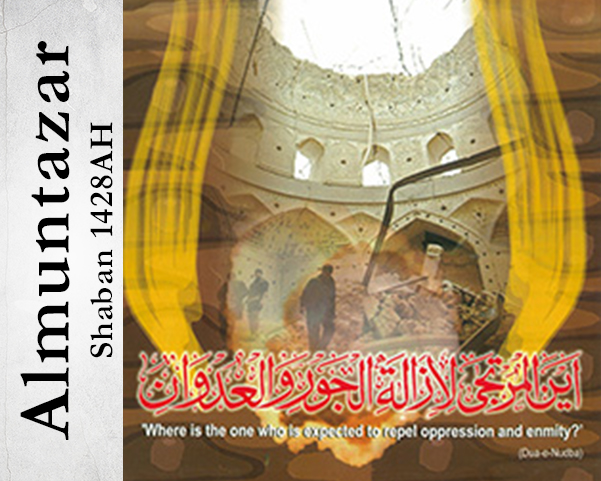A deed of allegiance (bay’atnamah) serves the purpose of conveying the idea of an ‘agreement’ present in its written format. It will be under the rules and
regulations of this very agreement that the workers, helpers, friends, companions and the populace as a whole, take the oath of allegiance and faithfulness to the Master of the Time (may our souls be sacrificed for him). Before we move on to mention some of the conditions of this ‘agreement’, it would be prudent to view in context the meaning of allegiance (bay’ah).
What does bay’ah mean? Where and when was the word used before the advent of Islam? And after the arrival of Islam, what historical importance did this word construe? Till what period did this word remain in common usage? Later, was its usage suspended or discontinued or did the word become clothed in seclusion so as to protect it from being usurped by tyrannical dynasties? Let us search for the answers of these questions in brief.
The literary meanings of bay’ah are oath, allegiance and covenant. Ibne Khaldun has noted in his Al-Muqaddamah:
(Tafsire Namuna, vol. 22, p. 70 from the al-Muqaddamah preface of Ibne Khaldun p.174)
‘When paying allegiance (bay’ah) to a ruler, they would, for emphasis, place their hands upon his hand. This action was like a transaction between a buyer and a seller.’
Bay’ah means oath, allegiance and covenant (Al-Munjid in Urdu). Gheyaas al-Lughaat has discussed it in greater detail by adding sincerity, loyalty, and
following in friendship.
Since the dawn of Islam, the word bay’ah has been used at the time of Hajj, when at Aqabah (in Ta’if) twelve persons connected with Banu Khazraj came from Medina and pledged allegiance (bay’ah) at the hands of the Holy Prophet (s.a.w.a.). This incident is known in history as al-Bay’ah al-Oola (the first allegiance).
After this, another group of seventy-three persons from Medina also pledged allegiance to the Messenger of Allah (s.a.w.a.) again at Aqabah. This
bay’ah is known as al-Bay’ah al-Saania (the second allegiance). ‘Al-Bay’ah al-Ridhwan’ is at the second important turning point in Islam. This is the historical allegiance finding mention in the Holy Quran and Allah, the Almighty, declares:
‘Surely Allah is satisfied with the believers who pledged allegiance to you (i.e. on the hands of the Prophet) under the tree….’
(Surah Fath, Verse 18)
This incident occurred in the sixth year of Hijrat when the Holy Prophet (s.a.w.a.) had set out for pilgrimage and had sent Usman Ibne Affan as his emissary to Mecca when a rumor spread that Usman had been murdered. Thereafter, the Holy Prophet (s.a.w.a.) gathered the believers and took oath and covenant that they would engage in war, fighting the unbelievers till their last breaths and would never flee from the battlefield. This oath of allegiance is known as Al-Bay’ah al-Ridhwan. When this news reached the people of Mecca, it resulted in great turmoil and anxiety, which ultimately culminated in the Treaty of Hudaybiah.
Bay’ah from women
The third important bay’ah worth mentioning here is the pledge of allegiance taken from women. The Holy Quran described it thus in Surah Mumtahenah,Verse112, which was revealed after the victory of Mecca ,
‘O Prophet! When believing women come to you giving you a pledge that they will not associate aught with Allah, and will not steal, and will not commit fornication, and will not kill their children, and will not bring a calumny which they have forged of themselves (i.e. they will not attribute the child of others to their husbands), and will not disobey you in what is good. Then, accept their pledge and ask forgiveness for them from Allah; surely Allah is Forgiving, Merciful.’
The aforementioned two deeds of allegiance mentioned in the Holy Quran with regards to the covenant of Prophethood of the Holy Prophet (s.a.w.a.) enlighten the context as well. When taking a pledge and oath from men, the focus is on steadfastness and consistency (not to flee from the battlefield). And it was only three years preceding (the oath) that this situation was witnessed. The Holy Quran has repeatedly emphasized steadfastness.
“Be steadfast, have patience, fight, fear Allah perhaps you may succeed.” The verse emphasized the affirmative aspects, i.e. the orders and prohibitions of Allah. The prospective factor of flight (from battle) generates itself rather quickly in men; hence the need for a firm stand was emphasized. After the passing away of the Messenger of Allah (s.a.w.a.), both the pen and the sword had undertaken an unscrupulous flight to generate a change in the mindsets of the Muslims, culminating in the drastic incident of Karbala.
The Imam of our Time (a.t.f.s.) laments over it:
‘If only I was at Karbala with you, I would protect you even at the cost of my life.’
(Ziyarate Naahiyah)
The Holy Prophet (s.a.w.a.) took the pledge of allegiance from women after the victory of Mecca and directed their attention towards the five prohibitions. {Readers can refer to the article of Moharram issue of Al-Muntazar (2001) captioned ‘Who are the Ale Ziyad?’ for some insight into their previous lifestyles. Some Arab women did possess the aforementioned
defects in mentality and morality. Therefore the prohibitions were imposed upon them}.
The next era of bay’ah is of Ameerul Momineen (a.s.). After the killing of Usman, the people of Medina and its outskirts gathered in numbers at the doorstep of Hazrat Ali (a.s.). They all took the oath of complete obedience to him. They pledged their unconditional allegiance at his hands, when he stated that ‘I have a right upon you and you have a right upon me. And your right is that be attentive towards your wellbeing and give you your complete entitlement from the public treasury, that I teach you so that you may no longer remain ignorant and train you in the manne r in which you style your life…. And my right upon you is that you fulfill (the conditions and duties of) your pledge and guard my interests either before me or behind my back. When I beckon you, you should respond to my call and when I order something, obey it.”
(Nahjul Balagha)
The third era is when Imam Hasan (a.s.) was sitting with some people, while the Amir of Syria, Muawiya, entered. Some people pledged allegiance at his hands, at which Imam (a.s.) remarked, ‘Do you not know that verily I am your Imam whose obedience is obligatory upon you (i.e. bay’ah is fundamental in Islamic law whose fulfillment is obligatory upon you. And you leave that for pledging your fealty to some other).’
(Kamaaluddin vol 1, p. 316, chap. 29, tradition 2).
The fourth setting of bay’ah can be witnessed at the time of Imam Husain (a.s.). When Yazid was crowned as king, he wrote a letter to the governor of Medina instructing him to extract a pledge of allegiance from Husain (a.s.), the grandson of the Prophet (s.a.w.a.) or despatch to him his severed head.
Accordingly Walid Ibne Atbah summoned Imam (a.s.) to Daarul Amaarah informing him about the mandate. Imam (a.s.) replied, ‘I am from the Ahle Bait of the Prophet (s.a.w.a.). I am the treasury of nowledge and Prophethood, the hub of the descent of angels, the focal point of all benevolence. O Amir! Yazid is a drunkard, kills noblemen and commits sin openly.’ ‘One like me will not pledge allegiance to one like him.’
It was only within six months of this incident that the event of Karbala took
place. Soon the chastity, purity and honor of bay’ah began to be exploited. Vile and debased rulers started demanding bay’ah from the chosen ones of Allah. It was a huge calamity for Islam. Before the enthroning of Yazid, Mughaira sent 140 persons from Kufa to Muawiya who paid allegiance to Yazid. Muawiya took the leader of this contingent aside and questioned him, ‘For how much did Mughaira buy your fealty?’ He answered, ‘400 dirhams”.
Bay’ah means love and loyalty, oath and covenant, purity and virtue. All of this was crushed and trampled upon by the deception and guile of the rulers. The soul of Islam was searching for its lost prestige and glory of yesteryears within the framework of bay’ah when the voice of Imam Husain (a.s.) rose through the air in Medina:
This voice enveloped the entire universe. The year 61 A.H. bears testimony that bay’ah became out of reach of the oppressive and debased rulers and enclosed itself in its last and safest refuge. The reappearance of Hazrat Hujjah (a.t.f.s.) is an established fact and so is the renewal of bay’ah at the time of his reappearance. At this juncture, we feel we are in the midst of a
beautiful dream and my heart swells with joy when I visualize the shape of bay’ah through the veils of its systems and commissioning. But as reality dawns, dispersing the threads of dreams, we can hear the muted anguish of the soul from behind the scrolls of dark deeds of an incapable people. Then, our existence is shaken by an intense fear. It is as if we have fallen flat on our
faces after the distant journey through history. We can see a known face sitting on the wall of Kufa, shedding tears at the slaughter of someone at the time of the martyrdom. He knows the truth but instead of responding to the call of ‘Is there any helper for me?’ he sits involved, in the blaze of the afternoon heat, tying himself with his companions in the fetters of interpretations.
This was the voice of our innermost selves, which was delivered through the tongue in the shape of a sigh. Fourteen centuries have passed from the event of Karbala and the advent of the Minor Occultation (Ghaibat-e-Sughra). The guards posted at the door of the ‘Solution of Difficulties’ have been since removed and the door of representation forever closed. The lengthy period of the Major Occultation (Ghaibat-e-Kubra) has indeed arrived. We, as Shias, now call upon the jurists (maraaje’) and the path to taqleed has been opened for the ease of myriad problems. The virtuous and the jurists, through their efforts and persistence, have maintained the link of solutions to our difficulties with Hazrat Qaem (a.t.f.s.). They have not let the dust settle on the moist flower of bay’ah. They have protected its originality, virtue, greatness, freshness and fragrance and gifted us its methodology through the supplications of the infallible Imams (a.s.). Furthermore, it is only after passing through an expedition of blood, travails, problems, efforts and research that the jurists have presented us with the light of perception and explanation of bay’ah and informed us of its beauteous form through the news that ‘Bay’ah is pledged only to the Messenger of God and the Infallible Imams (a.s.) and that the breaking of the bay’ah is a major sin’. And in Behaarul Anwaar vol 67, Chapter 10, p.185, H.3, it has been narrated from Imam Moosa b. Jafar (a.s.), “Three sins destroy a person and involve him in a grievous chastisement. The breaking of bay’ah, the leaving of Sunnah and forsaking the congregational prayers.”
The conclusion of this entire treatise is that the chapter of bay’ah is a lengthy discussion, having a historical facet, which introduces bay’ah in bold lettering. For bay’ah, there are certain conditions in belief and some scales by which the character, behaviour, activity, lifestyle, etiquette, food and clothing, individual and social contacts of the believers of the religion of
Allah, i.e. all that which is entrusted to the wealth of life, is measured and weighed. The difference between the proponents and opponents is clearly understood and a style of life with an understanding is developed. Those who wear the necklace (of bay’ah) around their necks, also have their differences in levels, views and opinions.
Let us view the time when the divine government will be established from this angle. When the Proof (Hujjat) of Allah will prevail upon the cities and the entire planet, when all the creatures and servants of Allah will come under the authority of the Caliph of Allah. When, for the first time, the brilliant sun of Imamat will make his brilliant visage apparent from the veil of the dense clouds of occultation (ghaibat). There, at the Maqame Ibrahim and the wall of the Holy Ka’baa, will be the 313 chosen ones of Allah to take precedence in stepping forward. They will pledge their allegiance at Imam’s (a.t.f.s.) hands. A refreshing dawn, uplifting the souls and permeating effervescence everywhere! The morning breeze will whisper peace and satisfaction. The scale of the value of bay’ah will be in front of us. The heartbeats seeped in divine benefaction will pound in praise of Allah and Imam (a.t.f.s.) in a divine litany making the surroundings beauteous. There will be the conditions, oaths and covenants. And there will be loyalty, friendship and sacrifice. The purest in lineage, focus of attention (a.t.f.s.) will be free from danger and fear. This bay’atnamah is the one, which was given in the written format by the leader of the pious, the Commander of the Faithful, Ali Ibne Abi Talib (a.s.) to his followers during his rule, so that hope should not be lost nor should desperation overwhelm the Shias. The awaiting (intezaar) should survive. The enlightened aspects of truth should be apparent. That very bay’atnamah is presented for the benefit of our readers. We pray to Allah the Almighty to make us present in the first row on the Promised Day to have the honor of giving bay’ah at the divine hand of mercy and success.
The companions of the Qaem (may Allah hasten his reappearance) will take a covenant at his hands that we will:
1. Not steal.
2. Not commit adultery.
3. Not abuse a Muslim.
4. Not murder anyone unlawfully.
5. Not violate anyone’s honor.
6. Not attack anybody’s dwelling.
7. Not harm anybody.
8. Not hoard gold, silver, wheat and barley.
9. Not usurp the property of the orphan.
10. Not give false testimony.
11. Not forsake the mosque.
12. Not drink wines and intoxicants.
13. Not wear clothes made of silk or golden thread.
14. Not wear a golden belt.
15. Not indulge in robbery.
16. Not attack travelers and wayfarers.
17. Not indulge in homosexuality.
18. Not destroy food stocks like wheat and barley.
19. Be contented with less.
20. Use perfumes and fragrances.
21. Stay away from uncleanne ss.
22. Exhort towards goodness.
23. Keep away from prohibited acts.
24. Wear coarse cloth.
25. Rest on an earthen pillow.
26. Strive in the way of Allah as is the right to do so. And Imam (a.s.) will promise them that
1. He will stay with them.
2. He will dress like them.
3. He will keep a mount similar to theirs.
4. He will work according to their will.
5. He will stay contented with a little.
6. He will, with Allah’s aid, fill the earth with equity and justice as it would be filled with oppression and tyranny.
7. He will worship Allah as is the right of worship.
8. He will not post a guard or sentry for himself.
(Kitabe Jahan b’ad az-Zuhur, p. 125-126)
Today’s Shia society (in any corner of the world) should give undiluted attention to the conditions of this oath and covenant. Big or small, educated or uneducated, everyone should safeguard this deed of allegiance like a prized object dear to his life. If care is taken of the prohibitions of this deed of allegiance, it will culminate in the shape of a healthy, happy and foresighted society. The freedom of a human being is kept in view from every aspect. You take an oath from the commanders and soldiers of your army that they do not indulge in unnecessary bloodletting nor usurp the wealth of an orphan. That they will refrain from adultery and other bad actions, they will lead a pure life, avoid flashy dressing, will not stare at women, will be satisfied with simple food, etc. They will remain clean and fresh, emanating fragrance. A point to be noted here is that they recline on an earthen pillow. This statement can be both factual as well as symbolic. It means that it is not incorrect for a soldier to sleep with the earth below as his pillow and the fact in account is also that his attribution is towards the service of the successor of Abu Turab (Ali Ibne Abi Talib). This highlights the characteristic of humility and modesty, even if the vast expanse of the world’s activities is within one’s control and the reins of governance in one’s grasp.
This deed invites an open-minded person towards justice and equity and urges him to keep it in perpetual consideration. It has been enshrined in the pages of history from the time of Ameerul Momineen Ali Ibne Abi Talib (a.s.) to reach to us today. The following questions take shape in this long period:
1. Are the paths of travels despite all precautionary inventions, truly safe?
2. Has the blood shedding decreased? The truth is that every step taken is on dangerous ground.
3. Has there been a decrease in the violation of human rights?
4. Is there no arson of scores of villages full of helpless innocents? Daily news informs us that global peace is being slaughtered. It is indeed lifeless. It is only for propaganda that a shroud of words covers the corpse of peace. It is only the hope of this deed of allegiance, which illuminates a thousand lamps in this encompassing darkness. The infallible (a.s.) has instructed that every Shia should recite Dua-e-Ahad in the morning with a heavy heart and contemplate on its meanings. Pay attention to these sentences of Dua-e-Ahad: ‘O Allah! Surely I renew for him (a.t.f.s.) on the morning of this day and of all evenings through my life, this pledge and oath and covenant upon my neck…’.
(Dua-e-Ahad, Mafaatihul Jinaan)
On the morning of this day Our day starts in the morning. Dua-e-Ahad reminds us that the day of trials is commencing. The accounting of the self is necessary. The practice of sacrifice should continue. It is a message of loyalty and trust to the nobles and a reiteration of contentment for the indigent. Keep the abdomen safe from prohibition and doubt. These are the days of character building, of beautification and smartening the persona and of rectification and reformation. Then there will be another such morning, another such dawn, the sun will rise, it will be noon, after which, the shadows will lengthen and the evening will fall. The night brings with itself, the stupor of slumber. And then the morning will return, and with, the chanting of Dua-e-Ahad by the worshippers. Finally, the listener will utter, “(O Allah!) Soothe my eyes with a glance at him (a.t.f.s.).”
Signs indicate that that morning is near when he (a.t.f.s.) shall arrive with a
bright, shining forehead, surrounded by his diehard lovers and followers. He will place the deed of allegiance, which has been preserved through the course of history, in front of them. Thereafter, he will take the oath of fealty from the officers and commanders of his army.
Raj’at
The Return (Rajat) will occur and old and antiquated graves will split. The awaiters in darkness will come alive, wrapped in shroud, spear in hand, responding to the voice of Imam (a.t.f.s.) and rushing forth to his service. The Dua-e-Ahad will be authenticated. Not only this, but the testimony of Dua-e-Ahad will be voiced that these are those who refreshed their oaths every morning and used to say:
O Allah! For the sake of Your Mercy, transform our filthiness into purity. Grant us the purity of the body and that of the heart. Save the vision of our eyes and the understanding of our hearts. Delusions are the order of the day. Confer upon us the grace to fight them. Bestow upon the ladies in whose embrace nurtures our nation, a ray of the illumination of the patience, knowledge, forbearance of Janabe Zainab (s.a.). And by the right of her veil, give the women of our households the grace to veil themselves. So that they train such offspring, who at the time ‘when the expanse of the earth is spread with justice and the court of the Imam (a.t.f.s.) is resplendent under the sky’, are present in the gathering and have the honour of taking the pledge of fealty.

